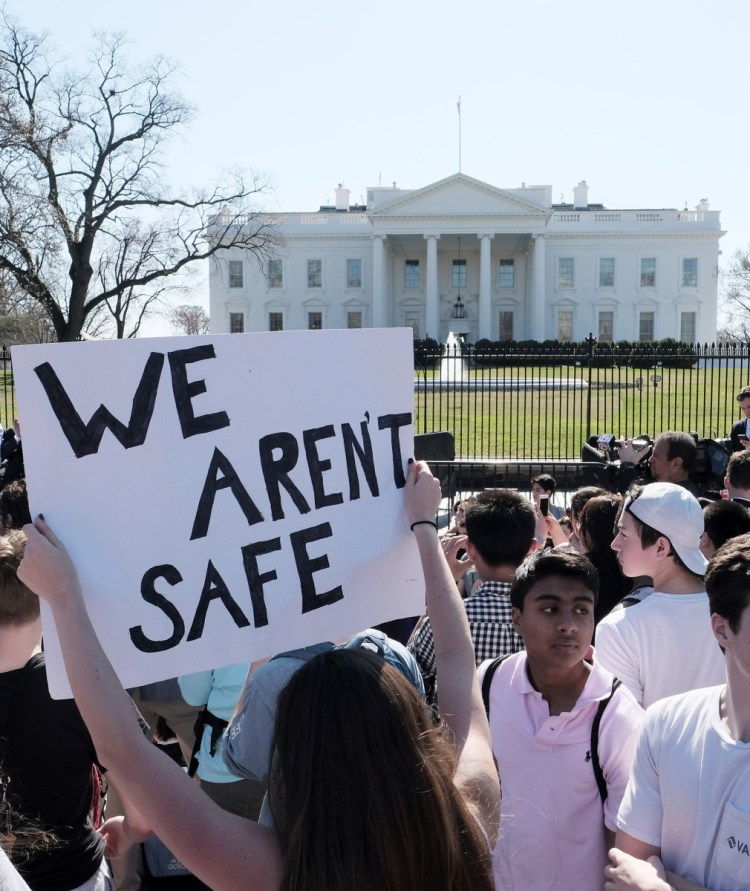MONROE — As students under fire in Florida speak out to end mass shootings, many hope this time it’s different. Indeed, their demand is compelling: Our representatives in Washington must act less like politicians and more like parents. Most of them have children; they should act like it.
But a fuzzy demand for “gun control” will likely squander this opportunity to save lives. To end gun deaths, we need to ban all civilian guns.
WHERE TO LAY BLAME?
Over 30,000 Americans are killed each year by gunfire. Since more than half of these deaths are suicides, it’s tempting to blame some of the victims. But every suicide is a tragedy. Many would be alive today if guns were less readily available. Blame the gun, not the person who took their own life with it.
It’s also tempting to blame mass shootings on an intractable American culture of violence. But as Max Fisher and Josh Keller reported in The New York Times last November, a 2016 study by University of Alabama criminologist Adam Lankford shows that the most compelling cause of mass shootings is the prevalence of guns. More guns equals more deaths.
Reviewing shootings that occurred in public places and killed at least four victims, Lankford found that the U.S. had 90 mass shooters between 1966 and 2012, and we have some 300 million guns. No other country had more than 40 million guns and 18 mass shooters in that period. To put this in perspective, according to the reporters, the only country with more mass shooters per capita than the United States is Yemen. The U.S. has more mass shooters per capita – and more guns – than Afghanistan.
Switzerland shows that gun control can go only so far. That country’s rate of death by gunfire is well below ours (30 per million Swiss compared to 105 per million Americans). Yet Switzerland has the second highest rate of gun ownership in the developed world – and the highest rate of gunfire deaths in Europe. Even with restrictive laws, gun ownership in any country kills.
UPDATING THE RULES
In response to mass shootings, many countries tighten gun laws. After one man shot 35 people in Australia in 1996, that country went a step further, initiating a buyback program that took an estimated 20 percent of firearms out of circulation. They haven’t had a mass shooting since.
In the U.S., eliminating guns looks politically impossible. Elimination would be difficult even if we carved out an exception for licensed hunting clubs to keep registered rifles under lock and key. How could a buyback program address our gun culture? Banning guns is especially problematic when the Second Amendment is touted as the right of any individual to own firearms.
Yet while we are a nation that reveres our Constitution, we are also one that changes it when it becomes clear that the Founding Fathers failed to see what modern times require. We changed the Constitution to allow women the right to vote. We reinterpreted it to protect the right to gay marriage.
We must have laws that keep Americans safe from gun technology that the Constitution’s framers never foresaw, from manufacturing techniques to laser gun sights to automatic weapons. Even a simple revolver was beyond their conceptual horizons. On the cultural front, the Australian experience suggests that pro-gun attitudes shift in favor of reducing weapons – once the restrictive legislation saves lives.
Abolishing guns will profoundly alter the American way of life for the better, just like women’s suffrage did. Is gun abolition too extreme? Not if human life comes first.
Many great political victories aim for what initially seems like an impossible objective. Opponents of slavery didn’t advocate “slave control.” They were abolitionists. Gandhi did not campaign to control the British – he sought Indian independence from a starting point that looked hopeless. Nevertheless, in both cases, proponents succeeded while stating their objectives in uncompromising terms.
GOING FOR A SOLUTION
In contrast, gun-control advocates have long espoused incremental aims while eschewing any overarching objective – and we have been completely overrun by the National Rifle Association. Background checks and banning AR-15s won’t suffice. Increased vigilance over the mentally ill might make a minuscule difference; only about 5 percent of gun killings are carried out by people with mental health issues. As long as we demand ineffective change, the NRA can rightly claim that we are either mistaken, delusional or dishonest.
If we want to end the carnage, we must advocate for the solution that is required, not one designed to be politically palatable. Instead of shying away from the NRA’s accusation that gun control advocates want to take away their guns, we should embrace it as a mantra.
Let’s clear the air and call for total civilian disarmament. Period.
Copy the Story Link
Send questions/comments to the editors.



Success. Please wait for the page to reload. If the page does not reload within 5 seconds, please refresh the page.
Enter your email and password to access comments.
Hi, to comment on stories you must . This profile is in addition to your subscription and website login.
Already have a commenting profile? .
Invalid username/password.
Please check your email to confirm and complete your registration.
Only subscribers are eligible to post comments. Please subscribe or login first for digital access. Here’s why.
Use the form below to reset your password. When you've submitted your account email, we will send an email with a reset code.